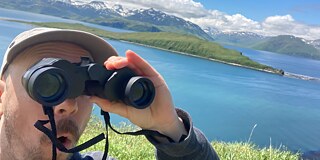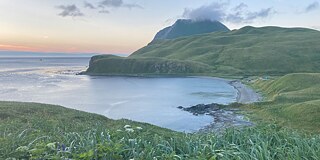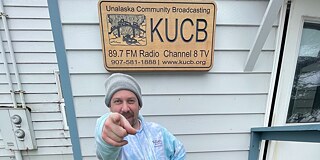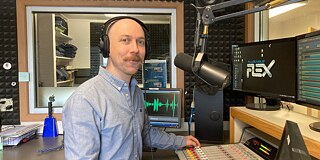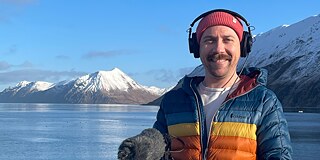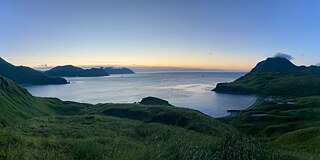Zeitgeister On Air Radio Around the World Alaska-Special

Theo Greenly hatte noch nie in seinem Leben von den Aleuten in Alaska gehört, als er auf eine ganz besondere Job-Anzeige stieß. Die Aleuten, das ist eine über eintausend Meilen große Inselgruppe voller schneebedeckter Vulkane, die sich von Alaska bis nach Russland erstreckt. Und der einzige Radio-Sender des Archipels suchte einen Reporter. Theo bewarb sich und bekam den Job. Heute erzählt er euch, wie es ist, auf einem Vulkan im Beringmeer zu wohnen und aus einer Entscheidung so viel mehr herauszubekommen als man auf der Rechnung hatte.
Podcast abonnieren: Apple Podcasts | Spotify | RSS
Transkript
[Tsunami siren]
Theo Greenly: That’s a tsunami warning – the siren.
[Rustling of footsteps]
Theo Greenly: We’re in. I’m going try to get to high ground.
Theo Greenly: It’s 11 o’clock at night in July, and I’m in Alaska – alone. Scrambling up a hill overlooking the Bering Sea.
[Rustling of footsteps]
Theo Greenly: Okay, I’m climbing up this hill.
Theo Greenly: I just moved to this island a few weeks ago. I was starting my new career as a radio reporter. I had freelanced for the past few years, but this was my first full-time job. So, one night, I’m out fishing for salmon at a beach outside of town when this woman walks up to me and says, “Hey man. Do you know that there’s a tsunami warning right now?” I did not know there was a tsunami warning. She asked me if I had a vehicle and told me I needed to get to high ground. So, I start driving back to town, but then I realized she isn’t behind me. So, I turn my head to look down at the beach to see if I could spot her car. And that’s when I ran my car off the side of the road.
[Rustling of footsteps]
Theo Greenly: I can’t believe I drove my car off the side of the road. What did you do, Theo?
Theo Greenly: I tried to reverse it. I tried to go forward. I pushed and rocked, but the car was stuck. That’s when I saw the woman’s truck. “Saved” I thought…until it turned up the hill in the opposite direction. I climbed onto the roof of my car and tried to flag her down. But her tail lights disappeared over the ridge. I was alone.
[Rustling of footsteps]
Theo Greenly: I’ve got to get higher.
Theo Greenly: So, I’m scrambling to get up this hill to get to high ground. I have a VHF radio. It’s like a walkie talkie, it’s what they use on boats. So, I turn it on and I listen to the boats that are pulling out of the harbor and into the open ocean.
[Radio voice]
VHF: First wave expected at 23:50.
Theo Greenly: Now, I am a news reporter. I’m supposed to be at the radio station warning the community that there’s this wave of destruction coming. But instead, I’m stranded at the beach.
Theo Greenly: I’ve never driven my car off the side of the road and I wait until there’s a fucking tsunami to do it.
[Rustling of footsteps]
Theo Greenly: I start recording on my phone, because, damnit, if I can’t be at the goddamn radio station, I’m going to be in the goddamn field.
Theo Greenly: It’s 11:43. Seven minutes to touchdown. Or what is it? Seven minutes to midnight? The doomsday clock. God, first contact at 11:50? Oh my god. What if I’m not high enough?
Theo Greenly: Well, we’re going to leave me stuck up on that mountain for a moment, because I think we need some background.
[Video music: “In the Aleutians – Isles of Enchantment”]
[Video sound: The Aleutians are a string of island bases extending over a thousand miles westward from the Alaskan peninsula. These islands once considered…]
Theo Greenly: This is a U.S. military video from the 1940s. See, the Aleutian Islands played a big role in the United States’ military history. The Japanese actually invaded during World War II. Most people don’t really know about the Aleutian Campaign. So it’s often called “The Forgotten War.” But this place is so much more. This land is ‘Unangam Tanangin’ – the land of the Unangax̂ people. This is a world of snow-capped volcanoes rising out of black seas, breaching humpbacks, tufted puffins, bald eagles and red foxes. I had spent the past ten years living in Los Angeles. I had freelanced for a few radio stations and newspapers, and done a couple internships. But mostly, I was a bartender. When I read the job description, I knew this was the adventure I needed.
[Quick military video music]
Theo Greenly: “Our award-winning newsroom is located in the Aleutian Islands, the ancestral home of the Unangax̂ People, who have lived in this region for more than 9,000 years. This is a news-rich region that’s surrounded by some of the most productive fishing grounds in the country, and in the middle of an international shipping corridor. You will be one of a handful of journalists based in this thousand-mile region.” Well, I got the job. And in June 2021, I moved to the island of Unalaska.
[Quick military video music]
Theo Greenly: Now, you can’t understand Alaska radio without understanding a little bit about Alaska itself – long story short: Alaska is huge, the population is small. And the people that live here are spread out in tiny towns and villages all around the state. And most communities aren’t connected by roads or, really, any infrastructure to speak of. So what connects them? The answer is: radio. Of course it’s radio – that’s the whole point of this podcast. You know that’s what I was going to say obviously. Okay, yes, radio connects them. Alaska has built up a robust network of public radio stations. They deliver weather, local events, airplane schedules, music, news and birthdays. All the community stations around the state have their own quirks – as different from one another as a sockeye is from a coho. A humpback from a white whale – okay, you get it. So, over in Bethel in western Alaska there’s KYUK on the Yukon-Kuskokwim River Delta.
KYUK: Looks like we’ve got a caller. Welcome to Talk Line.
Theo Greenly: Now they happen to be the first Native-owned and operated radio station in the United States.
Caller: I know everybody is thinking about fish right now, but I wanted to talk about something else I want for people to think about if they’re out this summer. And that’s moose.
Theo Greenly: They do a daily newscast in English and one in Yup’ik. Which is the only language many of the elders speak in the region.
KYUK: [Host speaking Yu’pik.]
Theo Greenly: Rural Alaska radio stations, especially in western Alaska, they are pretty well-known for their birthday lines, where people call in to wish their loved ones a happy birthday. Here’s one from KDLG in Bristol Bay.
Caller: Am I on Open Line?
KDLG: Yes you are, Jimmy. You’re our first caller.
Caller: Okay, happy birthday, Maya Liuk. Have the happiest birthday today. Today is Tuesday, right?
KDLG: Yes, Tuesday. April 12.
Caller: My birthday is coming up pretty soon.
KDLG: Oh boy! That’s exciting.
Theo Greenly: Now, if you haven’t spent time in Alaska, it might be easy to dismiss a birthday show like this as quaint or folksy. But it speaks to the vastness of the region and just how important radio is. It’s this community builder and it brings people, families and friends together over these vast landscapes. Many of these radio stations have a news reporter or two. We’re often the only news outlet for hundreds of miles. There are dozens of reporters like me scattered across the state. Up in the Arctic, you have Desiree Hagen who has been up there solo for about a year now.
Desiree Hagen: Arriving with his face covered in ice crystals, Homes gave his dogs a snack and briefly posed for photos as spectators braved the -40 degree cold to greet him.
Theo Greenly: 12 hundred miles south: Sage Smiley in Wrangell, covering her corner of the inside passage.
Sage Smiley: In the darkness, and especially in the driving wind and sleet, it was impossible to see across the strait to Woronkofski Island. The only visible marker of the barrier between land and sky were the three boats – two fishing vessels and a smaller skiff outlined in coloured Christmas lights bobbing in the black water back and forth next to the dock.
Theo Greenly: And Wesley Early holding it down in the big city.
Wesley Early: Officials are optimistic that Anchorage will see several days in a row of sunshine and warmth starting Thursday. But, they say, the warmth won’t stick around for long. Reporting in Anchorage, I’m Wesley Early.
Theo Greenly: All around the state us have us radio reporters – in Fairbanks, in Haines, in Kodiak, in… wait why am I doing this. There’s already a thing.
[Alaska Public Media clip]
Theo Greenly: We work in newsrooms of one, two or three, and in the rare cases of the big cities, a handful. We report from fishing boats, helicopters, city halls, and dog sleds. And day after day, we do what we can to keep the public informed.
[Music: KUCB newscast theme]
Hope McKenney: Coming up on KUCB news: Three volcanoes continue to erupt across the Aleutian Chain and support from the National Science Foundation will aid ice melt modeling – stay tuned.
Theo Greenly: Now, that frolicking voice is my news director in Unalaska – Hope McKenney. Hope grew up on a sheep farm in Northern California. She’s been in the radio biz since high school and this is her third year in Unalaska. Before coming up here, she did a stint at a big station in San Francisco. It wasn’t for her. She didn’t like that they made her wear shoes. Hope is the latest in a long line of enterprising news directors who’ve come out here. I can’t tell you about all of them. But there’s at least one more you ought to meet. Allow me to introduce you to KUCB’s very first news director – my good pal, Jim Paulin.
Jim Paulin: So when I first started in 1998 as the first news director, they didn’t have much of an antenna like they do now. They had a transmitter inside the city powerhouse. And outside they had a system that looked like a clothes line. I thought it was…
Theo Greenly: Jim lives in a cabin out on Captain’s Bay. There’s no water or heat, but it’s practically free and it’s right in the commercial fishing hubbub. Jim’s an old stringer – a newspaper man through and through. He did a few years up in Bristol Bay, then he went to the arctic to report from Kotzebue and he believes in the cause.
Jim Paulin: It’s really important to have reporters on the ground and, you know, living in these communities because you don’t get the coverage compared to larger places where there are reporters all the time.
Theo Greenly: Jim got to Unalaska during the Wild West days. Crab fishing was booming.
Jim Paulin: When he was swept overboard off the crab fishing vessel Exito, another monstrous wave struck the Burning Star the same day, last Wednesday, causing substantial damage but only minor injuries. The wave crashed through the rear house window, disabled the vessel’s electronics and actually stripped the sweat shirt off the crew member at the helm according to a skipper [unintelligible].
Theo Greenly: Jim’s semi-retired now, but he still has his ear to the ground the way only a seasoned newspaper man can. And he’s still writing some. Now, Unalaska has cleaned up since Jim got here in the derby days. We have civilized in the past 20 years. We’re not as rag tag. But, we’re still a little rag tag. Case in point, Maggie Nelson – daughter of a coal miner, Master’s degree in English literature. Together, the three of us, Hope, Maggie and I, produce a daily newscast. Sometimes it’s just one of us running the show while the others are out on reporting trips. And sometimes, it’s all hands on deck. That’s especially true when there’s breaking news like, say, a severe weather event – or at least that’s how it’s supposed to be.
[Radio clip: Tsunami warning]
KUCB: Attention Unalaska: Our community is currently under a tsunami warning…
Theo Greenly: Back on tsunami mountain and I’m not contributing much to the news.
Theo Greenly: 7, 8, 9, 10, 11, 12, 13, 14, 15, 16, 17, 18, 19, 20, 21, 22, 23, 24, 25, 26, 27. At least 27 boats – fishing boats. A barge…
Theo Greenly: I’ve been on the hill for a couple hours now. It’s dark, and past the projected wave. But we still haven’t received the “All clear”. Then I see a pair of headlights turn on, way across the bay. That car at the top of the hill is finally coming down.
Theo Greenly: Okay, that car on the other side of the hill just turned on and I see their headlights driving down the road. So, I’m trying to get down the hill to the road…
[Rustling of footsteps]
Theo Greenly: So I book it down that hill. And I’m scrambling down the tundra, trying not to break my ankle and make it onto the road. And I stand in the middle of the gravel road waving my arms. The truck stops.
Theo Greenly: I’m the guy who you told that there was a tsunami. Was that you?
Theo Greenly: I realize it’s not the same woman as before.
Theo Greenly: I drove my car off the side…I’m stuck there. Are you going back to town?
Woman: Yeah.
Theo Greenly: Do you think that I could come with…I know that this is…my name is Theo, I work at KUCB – at the station. I’m stranded. I went up the hill…
Theo Greenly: And she is not having it. She just kind of looks at me blankly. I explain who I am, I name some people in town to prove it. And she starts to become amused by how befuddled I am and so she agrees to take me back to town. When I get back to the station, everybody is there. Maggie is writing an update. She’s has been working with statewide breaking news editors at Anchorage. And I can see that I had a lot to learn.
[Music: KUCB newscast theme]
Hope McKenney: Researchers looking into the decline of stellar sea lions have noticed that the concentration of mercury levels in lion pups was increasing in some parts of the Aleutian Islands. But what’s causing those mercury levels to rise? KUCB’s Theo Greenly reports that a team of scientists from around the country have teamed up to try to solve that mystery.
Theo Greenly: Caroline Funk is sorting through about a hundred small plastic bags. They are laid out across a table in the back room of the Museum of the Aleutians in Unalaska.
[Rustling]
Caroline Funk: A lot of toes and ribs…here’s a bird bone.
Theo Greenly: She is looking through bits and pieces of animal bones found in ancient Unanga village sights across the Aleutian Chain.
Caroline Funk: Oh, here we go. That’s why this bag is here. This is a scapula.
Theo Greenly: I feel like I won the lottery. We get to report the coolest stories. I mean I get to interview scientists that were doing chemical analysis of ancient seal bones. They cut out slices with a saw.
[Drilling noise]
Caroline Funk: It smells like a dentist’s office.
Theo Greenly: Hope and Maggie and I get to report from helicopters and tug boats – or like this story that Maggie did on a fishing boat.
[Clip: Raven Bay]
[Clip: Navy warship stops in Dutch Harbor on way to Arctic military exercise]
[Clip: The niĝilax̂ makes a comeback after 200 years in obscurity]
[Music: Distill. Blue Dot Sessions]
Theo Greenly: Now, Alaska has the highest Indigenous population in the United States, per capita: about 20%. But that population is not represented in the state’s newsrooms. And lots of the stories we do up here involve Indigenous affairs. So, there’s a big conversation going on about reporting on communities that aren’t your own and representation in newsrooms. And in Alaska, many people are taking great strides to try to change the representation in newsrooms. Now, we don’t have the time today to really do this conversation justice. And I’m not the person who should be leading such a conversation. What I will do though, is make a couple recommendations. I highly recommend anybody check out the Native American Journalists Association, N.A.J.A. or NAJA. And the other recommendation I want to make is a podcast called Coffee and Quaq and that explores contemporary Alaska Native life.
[Music ends]
Theo Greenly: Living in Alaska can be really fun. I’ve gone snowboarding down a volcano overlooking the Bering Sea. I spent two weeks camping and kayaking down North America’s biggest fjord. We go fishing, pick berries, have dinner parties and saunas and polar plunges. But it’s also a grind. The daily newscast can be a beast, it’s never ending. I began to notice this trend. It seems that every few months, a reporter leaves their radio station. Often they leave the entire network to take a job in another state. And these e-mails can share a similar tone: “Due to my mental health, I’ve decided to take a break from reporting,” or some such sentiment. First, I dismissed these as being spoiled or something. But I can start to feel it. You’re just never caught up. You’re always behind. It can feel like you’re drowning. But it’s also the most exciting and rewarding job that I’ve ever had. So you know, you’ve got to weigh the pros and cons, gotta weigh the pros and cons.
[Music]
[Airplane ambience]
Theo Greenly: I’m on a Saab-2000 twin prop plane, on my way to go report from the Eastern Aleutians for a month. I’ve been in Alaska for a little more than two years. By now, I can easily tell the difference between a seal and a sea lion. I text the mayor directly when I need a comment for a story. And I can write broadcast copy about as quickly as I can speak it. I’m also wearing sweatpants more than I ever have – like, all the time. Well, technically they’re joggers. The radio station intern meets me at the airport.
Theo Greenly: Hi, I find ‘ya? Nice to meet you.
Malia: You too, I’m Malia.
Theo Greenly: I’m Theo.
Malia: Nice to meet you. How long are you here for?
Theo Greenly: For a month…
Theo Greenly: Malia is a local. She just graduated high school. She shows me the radio station. It’s on the ground floor of city hall. Sand Point has about nine hundred people, mostly fishermen. I’ll mainly be working alone. Malia will be in and out. And if I’m lucky, the radio technician will be there in between fishing trips.
Virgil Porter: You really don’t have to do much other than is there a problem there? Yeah. Is this, is this, and then….
Theo Greenly: Virgil Porter – radio technician, salmon fisherman, barstool philosopher and general fount of purple swirling energy force fields. He used to be a reporter for the San Francisco Chronicle. But he saw the writing on the wall. Newspapers were going the way of the California sardine fishery – which collapsed. The fishery collapsed if you ain’t up on your fisheries history. So, Virgil moved to the Shumagins 20 years ago and has been fishing ever since.
Virgil Porter: And Theo, once again – you are in the Shumagins for…?
Theo Greenly: Reporting, I’m doing some reporting here.
Virgil Porter: OK. Excellent. Awesome. Glad to see you here. Well, holy heck, holy heck, glad to have you…
Theo Greenly: I get settled in. I go hiking where I can look across the strait to the snow-capped mountains of the Alaska Peninsula. I find sand dollars and agates on the beach. Virgil takes me out on a skiff to Unga Island. We see half a dozen humpbacks, hundreds of puffins, and an abandoned village sight. These things are amazing. But most of my time in Sand Point, I’m alone. I start to wonder what I’m doing in this small town so far away from anyone I know and love. I’m 38. And all the people my age in this town seem to be married with kids. I go to the bar and talk about fishing with folks. And then I head back home. I’ve spent the past two years asking people questions about their lives. And I haven’t really thought too much about my own.
[Music: Fisheries report theme]
Host: The Alaska fisheries Report is brought to you in part by the Alaska Marine Safety Education Association.
Theo Greenly: Well, it’s my first Saturday night in Sand Point. I’ve just poured myself a bourbon and I’m settling in on the couch, listening to the radio. Then, all of a sudden, the house begins to sway. First, I think there’s some heavy machinery driving by…but I’ve been through this before. It feels pretty earthquaky. The shaking subsides and I start to get my bearings. This was a big one. For sure going to trigger a tsunami warning. “Oh god,” I think. “I have to go to work.” I get into the truck and turn on the radio. And it’s already playing the Emergency Alert System.
Radio: Alaska daylight time on July 15, an earthquake with preliminary magnitude of 7.3…
Theo Greenly: I figured they must have a trigger set up with the Emergency Alert System, or maybe Virgil’s already at the station.
Radio: …magnitude 55 miles from Sand Point. Estimated arrival times for the first in a series of tsunami waves are as follows…
Theo Greenly: Oh man. Why does this happen any time I go to a new island?
Theo Greenly: They figure a little more than an hour before the first tsunami wave is expected. That’s plenty of time to check in at the station, make sure the emergency alert’s all set, go down to the harbor, take some photos of boats leaving, maybe get the harbormaster or someone for a quick comment, then get back up to high ground and write the news.
Theo Greenly: Of course, I’m driving into town and all these cars are driving in the opposite direction. As I drive down into the thick of it.
[Tsunami warning]
Theo Greenly: Nobody is at the radio station, but the Emergency Alert is all set. I drive to the docks and take some pictures of the boats leaving the harbor. Back in the truck, I see a girl in her twenties walking along the road. She looks like she just got off a fishing boat. Everyone is leaving the harbor. But she’s just standing on the side of the road picking wildflowers.
Theo Greenly: Are you okay? Do you need a ride to high ground? You’re not worried about the…
Girl: I don’t know, do you think that there is actually going to be a tsunami though?
Theo Greenly: I think there could be. Alright, well, they say…I mean it’s 11:28 right now. They are saying that the first wave would hit at 12:10. So that’s 40 minutes from now to get to high ground.
Girl: I’ll make sure to be at the boat by then.
Theo Greenly: Well, okay. The boat has to go out. If you’re on land you’ve got to get to high ground.
Girl: Yeah…
Theo Greenly: Okay, well…
Girl: I’ll be good. Thank you, appreciate it. Good night.
Theo Greenly: You too.
[Car drives away]
Theo Greenly: She did not give a fuck.
[Tsunami sirens]
Theo Greenly: I’m struck that my two tsunami warning situations involve me either trying to convince a strange woman to get into my truck or to let me into hers. No time to unpack that one. I’ve got to get to high ground. I’m almost back at the house when my phone rings. It’s Teigen from Alaskan Public Media – our breaking-news editor in Anchorage. She’s already working on a story with the reporters from Kodiak, which is also in the tsunami zone. And then I get to work. One person is on the line with the earthquake observatory, another is writing up copy. I submit my pictures. I call the chief of police. And the article is ready to go. I love what I do. I love that I get to work with this network of reporters and editors. I love that I have a protocol for when there’s a tsunami warning. I love that I know the difference between Atka and Attu and Adak and Akutan. They’re islands. But I’m also tired. I’m drowning in stories. The second I hit ‘publish,’ I’m already behind on the next one. You know, when I first moved to Unalaska, I met a local guy who said to me: “There have been a lot of reporters who move up here for a few years. They get their stories. They leave.” Hope and Maggie are on their way out. And I have an itch to move closer to my family down south. KUCB just hired two new reporters, in fact. They’re training now. I think they’re going to be good. Anyway, I could talk about radio all day, but we’re going to have to pick it up another time. I’m on deadline. I’ve got to write the news.
[Tsunami warning]
Warning: A Tsunami Warning has been issued for this area. Tune to your local radio station for details.
Theo Greenly: Tune to your local radio station for details.
[Music: KUCB newscast, new theme music]
Sofia Stuart-Rasi: You’re listening to KUCB 89.7 FM Unalaska. It’s Monday, July 17, 2023. I’m Sofia Stuart-Rasi with some local news. A magnitude 7.2 earthquake triggered a tsunami warning for the Alaska Peninsula and Kodiak Island late Saturday night. The strong earthquake hit about 60 miles southwest of Sand Point, shortly before 11 at night. A siren sounded in local communities including Sand Point and Kodiak, with officials urging residents to seek higher ground. The tsunami warning was later downgraded to an advisory and was canceled altogether by one in the morning on Sunday…
[FADE OUT]
